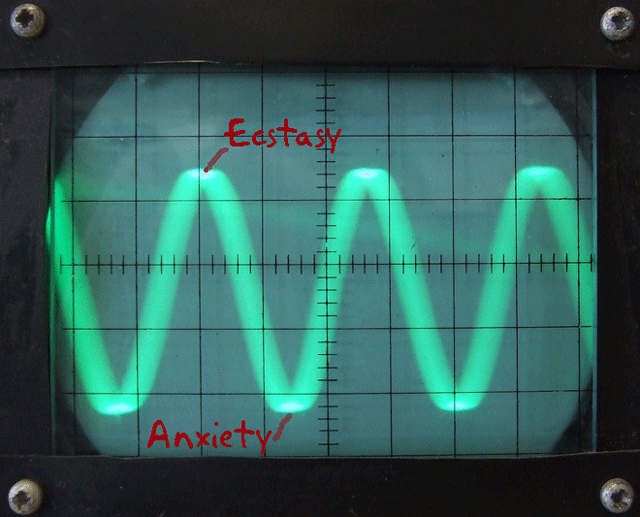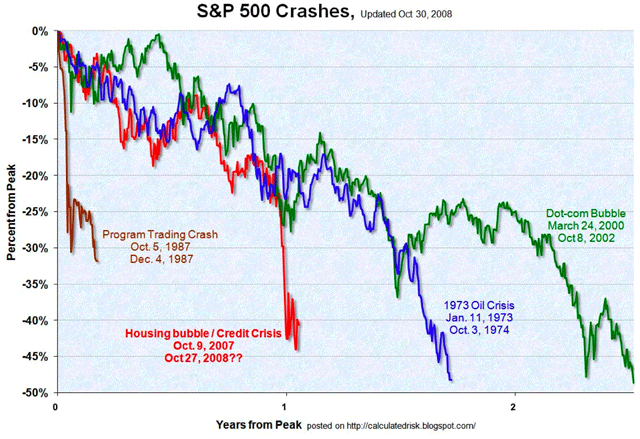June 27, 2011
The Agony and the Ecstasy

Earlier I posted a note about what might amount to nostalgia, one of my earliest influences when I was a sailor (go ahead and trace the TimeLine Bio for a few more details). I was thinking of radar navigation, plotting charts with the ship's position, course and speed, calculating set and drift, of closest points of approach. I was thinking about how we constantly try to calculate our place in the world and how much we are subject to external forces and how we have to take this into account in charting our journey in life.
Somehow I think that this trip down memory lane was a prehension of a brewing controversy in our art world.
I've been reading the recent brew ha ha about a perceived herd mentality as reported in Sharon Butler's Two Coats of Paint. Folks have been talking about this for at least a couple of years now. Butler does a good job with a roundup.This week, after a trip to the Venice Biennale, Jerry Saltz worries about the state of the art world and suggests that younger artists have hit a rough patch. At the Biennale he "saw the same thing, a highly recognizable generic ?institutional style whose manifestations are by now extremely familiar. Neo-Structuralist film with overlapping geometric colors, photographs about photographs, projectors screening loops of grainy black-and-white archival footage, abstraction that?s supposed to be referencing other abstraction?it was all there, all straight out of the seventies, all dead in the ?water. It?s work stuck in a cul-de-sac of aesthetic regress, where everyone is deconstructing the same elements....Instead of enlarging our view of being human, it contains safe rehashing of received ideas about received ideas."Her post skewed towards the injustice of a bias toward emerging (young) artists:
it becomes clear that talented mature artists are making penetrating and imaginative work. They just don't get invited to the international biennials.
The Saltz piece is a karate chop to the neck, and almost amounts to a mea culpa:
Art schools are partly the villain here. (Never mind that I teach in them.) This generation of artists is the first to have been so widely credentialed, and its young members so fetishize the work beloved by their teachers that their work ceases to talk about anything else. Instead of enlarging our view of being human, it contains safe rehashing of received ideas about received ideas. This is a melancholy romance with artistic ruins, homesickness for a bygone era. This yearning may be earnest, but it stunts their work, and by turn the broader culture.I first noticed a problem when I was teaching in the 90's (adjunct professor, architecture, 8 years) when I realized that a significant portion of my students were only interested in what they had to do to get the best grade, and not so much with the dimension of personal content that they had a chance to cultivate with each architecture design studio assignment. This dimension, I maintained, was crucial in helping them focus their curiosity and self-realize as creative actors. Merely fulfilling course requirements gave them a "C", exceeding them a "B", fluorescing earned them an "A". Using this account of mine as a lens to view today's art school environment, teachers must be culpable in today's transmission of received ideas. There must be an overwhelming sense of consensus amongst art school faculty in what constitutes "fluorescence". Indeed, like a Fannie Mae subprime derivative, guilt and culpability has been multiplied, buried and spread far and wide.
?Oh Mira, you?re such a hippie!.?
Butler's post links to an almost epic Mira Schor post that hinges on the above quotation, ending with a number of wonderfully chunky excerpts, notable among them, Recipe Art.

Kris Chatterton weighed in in his Facebook page:
Will all of the talk about younger generations of artists and the influence of older generations upon them I found this to put it all in perspective. Posted last week by Stephen Truax.And he linked us to defense of appropriation, The ecstasy of influence: A plagiarism, By Jonathan Lethem (Harper's Magazine), evidently an ironic play on Harold Bloom's Anxiety of Influence. I Wiki thusly:
Bloom's central thesis is that poets are hindered in their creative process by the ambiguous relationship they necessarily maintained with precursor poets. While admitting the influence of extraliterary experience on every poet, he argues that "the poet in a poet" is inspired to write by reading another poet's poetry and will tend to produce work that is derivative of existing poetry, and, therefore, weak. Because a poet must forge an original poetic vision in order to guarantee his survival into posterity (i.e., to guarantee that future readers will not allow him to be forgotten), the influence of precursor poets inspires a sense of anxiety in living poets.Lethem impressively leads off with John Donne and lives up to the reference in a great Harper's article:
All mankind is of one author, and is one volume; when one man dies, one chapter is not torn out of the book, but translated into a better language; and every chapter must be so translated. . . .
Highly recommended.

Maybe the extents of set and drift, of north and south, of windward and leeward, of ecstasy and anxiety, of influence and originality are unavoidable in life. Maybe we shouldn't worry so much about how one should win over the other, and instead consider what kind of course we plot, of what kind of oscillation we vibrate at. Maybe the argument should be about the virtue or vice of wild swings versus tight fluctuations about a mean... and what might lie in between?
Our best universities have forgotten that the reason they exist is to make minds, not careers. By William Deresiewicz, and I couldn't help but reflect on our art world the whole time as I read it, I don't think it's only about the Ivy league. Here's a slice from the middle:
But if you?re afraid to fail, you?re afraid to take risks, which begins to explain the final and most damning disadvantage of an elite education: that it is profoundly anti-intellectual. This will seem counterintuitive. Aren?t kids at elite schools the smartest ones around, at least in the narrow academic sense? Don?t they work harder than anyone else?indeed, harder than any previous generation? They are. They do. But being an intellectual is not the same as being smart. Being an intellectual means more than doing your homework.
Postscript:
A bit more should be said about the overwhelming sense of consensus... in what constitutes "fluorescence".
One could say that the problem comes from market forces, but what influences market forces? We are riding a larger cultural wave, and it has a name: postmodernism. Since the zenith of modernism in the Abstract Expressionism of the New York School in the late 50's, the world flipped in a revolution that remade art whole cloth. If to be modern is to reconcile what you make with the life you are living, and if the Ab Ex folk were trying to touch G-d through material means, the postmodern era was born with the vision of trying to touch everyday life through conceptual means. Generations of movements gyrated in sequence: Pop, Minimalism, Conceptualism, Critical Theory, Identity Art, CEO Art (a category that I have contrived to understand Hirst, Murakami, Pardo et al.: the art of the deal) and so on... and the narrative arc that describes all of this is postmodernism, a postmodernism that strains to touch everyday life through conceptual means. This, is the consensus that I am referring to.
Moreover, I am saying that there exists and has existed a meta-consensus in an implicit agreement not to talk about it as such. Postmodernism is the name that couldn't be, and still can't be spoken in polite art crowd company since the beginning of the 90's. To do so was to commit the sin of attempting to foist a grand narrative and such a category of ideas was then and are still now, verboten. No one thinks it's cool to reference our generation's penchant to think that we have mastered irony and have thus arrived at The End of History. Such hubris! Thank G-d that we had a prominent philosopher in the person of Fukuyama to coin the phrase for us, provoked as he was by the end of the Cold War. A culture that has the ego to think that it has formulated the last word, the ultimate worldview (even as blind as we were, that irony had twisted in our hands, masters we had believed ourselves to be of paradox itself), we shouldn't be surprised to find our arrival at a kind of stasis, rot, torpor, call it what you wish. Painting has been declared dead many times over (G-d and truth too, but that's now ancient history), the author was interred too long ago, originality has long been considered a fool's game... and now we are surprised that few or none of our young artists are sweeping us off our feet with something outside of our own tidy little big box?
We can't move forward until we all question (or interrogate, to use that horrid, fashionable term) the fundamental premise of our generation, now aged over fifty years now. Unless we do this, subsequent chapters of art history cannot be written. Unless we do this, art history is over. Unless we do this, all we can do is to scribe footnotes and annotate the bibliography... and not much else.
Posted by Dennis at June 27, 2011 6:21 PM
Nice share, I'm really appreciate your post. Thanks.
Nice share, I'm really appreciate your post. Thanks.